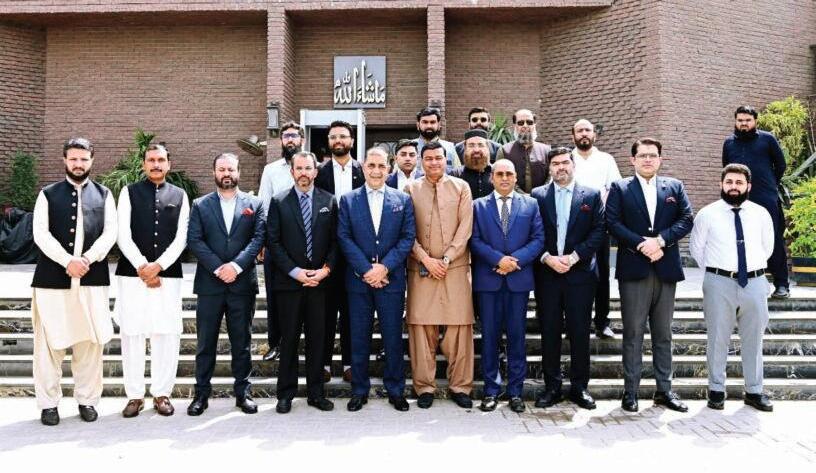

REFINERY CEOS PLEDGE FULL SUPPORT FOR DEFENSE FUEL NEEDS IN MEETING WITH PETROLEUM MINISTER

A new National Agri-Trade and Food Safet y Authorit y gets approved, older ones scraped amidst concerns over provincial autonomy
imal quarantine, which is fundamental to food safety ” a biosecurity expert said The board will include provincial secretaries of agriculture food and livestock departments; federal representatives from food security, climate change, commerce, science and technology, and finance ministries; two women experts in food safety; two academic or research institution members; and three industry representatives including from the Federation of Pakistan Chambers of Commerce and Industry (FPCCI) Technical experts fear that the board s majority of non-technical bureaucrats could undermine scientific decision-making The Director General of NAFSA will serve as ex-officio non-voting secretary
control programs and adopt NAFSA’s policy directives In case of disputes advisory and scientific committees constituted by NAFSA will have the final say raising fears that provincial autonomy in food and agriculture governance could be curtailed It is ironic that President Asif Ali Zardari who championed the 18th Amendment is now facilitating its rollback ” said a source from Hyderabad Food safety and agriculture are provincial domains This move undermines both the letter and spirit of the Constitution
said a legal analyst, while talking to Profit
Plant Protection Convention (IPPC) and the Animal Quarantine Department (AQD), responsible for preventing the entry of foreign animal diseases Their functions will now be consolidated under the newly formed NAFSA headquartered in Islamabad with authority to establish regional offices NAFSA will operate as a statutory corporate body, akin to provincial food authorities Policy oversight will rest with a board chaired by a Prime Minister-appointed individual possessing at least twelve years of experience in food safety agronomy public health or trade Notably qualifications in entomology, plant pathology, or plant protection have been excluded raising concerns that the new authority will lack focus on biosecurity functions “Their entire focus seems to be export certification ignoring plant and an-
NAFSA has been granted sweeping powers to implement sanitary and phytosanitary (SPS) measures across Pakistan These include registration and regulation of food and pesticide businesses, enforcement of quarantine measures, certification of import/export consignments and nationwide oversight of food safety The Authority can accredit laboratories monitor pest-free zones conduct veterinary diagnostics, and impose penalties It is also empowered to outsource functions, levy service fees, hire consultants, and seek funding from both domestic and international sources
Crucially NAFSA will regulate interprovincial trade and enforce harmonization of provincial laws with federal SPS standards While the ordinance mandates provincial coordination, it upholds federal supremacy Provinces must submit annual
Each province already operates its own food safety authority under independent legislation: The Punjab Food Authority (2011) Sindh Food Authority (2016) KPK Food Safety Authority (2014) and Balochistan Food Authority (2014) Experts warn that NAFSA will replicate existing functions, create jurisdictional confusion, and increase regulatory costs for businesses
The ordinance also poses risks to international trade The IPPC and World Organisation for Animal Health (WOAH) require official government quarantine departments not corporate bodies or private contractors for biosecurity certification Only designated civil servants are allowed to perform inspections Surprisingly the government kept the ordinance hidden from the Council of Common Interests (CCI) the primary federalprovincial coordination forum Experts say the ordinance bypasses democratic process and ignores stakeholder consultation A law with such far-reaching implications should have gone through the Parliament ”
The new Authority will be funded through a non-lapsable fund comprising federal budget allocations donor assistance service fees penalties and income from consultancies It will be audited annually by the Auditor General of Pakistan, with additional audits permitted by the federal government Despite assurances the ordinance has reignited the debate over federal-provincial balance in Pakistan s post-18th Amendment constitutional setup Legal and political challenges are expected as provinces assess its implications Critics also point out that similar proposals to restructure the DPP and AQD into a centralized authority were rejected during Nawaz Sharif s government after extensive review That administration prioritized strengthening DPP port infrastructure and hiring inspectors rather than dissolving the departments Although coordination mechanisms such as the National Biosecurity Technical Committee National Plant Health Committee and National Food Safety Committee were established in August 2024 to improve collaboration without compromising jurisdiction, insiders claim vested interests are now driving the push for NAFSA
It s about handing control to private players said a source familiar with the development A few influential officials in the Prime Minister s Secretariat and Ministry of National Food Security and Research are working behind the scenes to benefit companies they are connected with ”


COMMENT
A cautious step for ward
TH E State Bank of Pakistan’s decision to cut the policy rate to 11% is a welcome move for the trade and industry sectors, which have been advocating for a significant reduction However, this step should be viewed with caution, especially given the current global economic landscape
The rate cut is largely driven by lower-thanexpected inflation, which dropped to 0 3% in April due to a decline in prices of key food staples and a cut in electricity and fuel charges While this trend is encouraging, it is essential to consider the broader economic context The Monetary Policy Committee s statement highlights the importance of maintaining a measured monetary policy stance given the heightened global uncertainty surrounding trade tariffs and geopolitical developments
The global economy is facing significant challenges, including a sharp decline in global oil prices and heightened financial market volatility The International Monetary Fund has downgraded its growth projections for both advanced and emerging economies, citing tariff uncertainty In this backdrop, Pakistan’s economy though showing signs of improvement remains vulnerable to external shocks
The provisional real GDP growth for Q2-FY25 was reported at 1 7% year-on-year, and the current account recorded a sizable surplus of $1 2 billion in March, mainly due to record-high workers’ remittances However, the shortfall in tax collection has continued to widen, posing a challenge to the government s fiscal management
The rate cut should be seen as a step towards stimulating economic growth but it is crucial to ensure that the economy grows on a sustainable basis The Monetary Policy Committee’s assessment that the real policy rate remains adequately positive to stabilize inflation in the target range of 5% to 7% is reassuring Nevertheless, the committee s emphasis on maintaining a measured stance underscores the need for caution
As Pakistan navigates the complexities of the global economy it is essential to prioritize stability and sustainability The rate cut is a positive step, but it should be accompanied by prudent fiscal management and structural reforms to ensure that the economy remains resilient in the face of external challenges With cautious policymaking and a focus on sustainable growth, Pakistan can build on its recent economic gains and achieve long-term prosperity

Dedicated to the legac y of late Hameed Nizami Arif Nizami (Late) Founding Editor
M A Niazi Editor Pakistan Today Babar Nizami Editor Profit
India’s blame game falls flat


IN the immediate aftermath of the tragic terrorist attack in Pahalgam a heavily militarized yet scenic area of Indian-administered Kashmir India’s response was marked by outrage rather than introspection Yet, ten days later, no retaliatory action has occurred Domestically Prime Minister Narendra Modi finds himself increasingly isolated while internationally India stands diplomatically cornered for attempting to implicate Pakistan without credible evidence Despite fiery rhetoric, India s inaction reflects a sobering realization: any military confrontation with Pakistan would be regionally destabilizing, globally condemned and potentially catastrophic India’s restraint from launching punitive strikes against Pakistan can be attributed to four compelling reasons First Prime Minister Modi s narrative failed to gain traction among critical segments of Indian society including Indian Muslims, ordinary citizens, and even Kashmiris and victims of the attack many of whom demanded evidence before blaming Pakistan
Second Pakistan’s swift and robust military readiness served as a strong deterrent making any offensive operation risky Third the global community including major powers like the United States, Russia, China, the European Union, the United Kingdom, and the United Nations, collectively cautioned India against taking aggressive action without concrete proof Lastly the absence of international support left India diplomatically isolated forcing it to reconsider any rash military options Not a single opposition party supported the call for action against Pakistan Civil society, religious minorities including a vocal segment of the Sikh community and even victims’ families publicly questioned the government’s rush to assign blame without evidence Interviews conducted with Kashmiri civilians in Pahalgam revealed a powerful counter-narrative: while many condemned the attack they rejected the notion of Pakistani involvement in the absence of concrete proof
More compellingly, survivors recounted how local Kashmiris risked their own lives to shelter and assist fleeing tourists an act of humanity that contradicted the vilifying rhetoric being propagated by New Delhi
The attack was universally condemned including by Pakistan Yet instead of rallying global support India s accusations failed to gain traction among international powers or even within its domestic political spectrum Major global stakeholders ranging from the United States, China, Russia, Saudi Arabia, and the European Union issued strong condemnations of the ter-
rorist act but stopped short of echoing India’s allegations Pakistan for its part responded with urgency and maturity Its air force army and navy were placed on high alert to defend against any incursion, and preparations for a measured counterstrike were reportedly in place Yet, Islamabad’s official posture remained one of composure and diplomacy Pakistan reiterated its commitment to peace and offered to form a joint investigation commission national or international in nature to identify and prosecute the perpetrators It was a move that showcased both moral clarity and strategic sophistication International reactions reflected this cautious approach US Vice President JD Vance emphasized the importance of restraint stating “Our hope here is that India responds to this terrorist attack in a way that doesn t lead to a broader regional conflict and urged Pakistan to cooperate in addressing terrorism emanating from its territory President Donald Trump condemned the attack as deeply disturbing and reaffirmed support for India, expressing solidarity with Prime Minister Modi and the Indian populace U S Secretary of State Marco Rubio engaged in diplomatic outreach speaking with Indian Foreign Minister Subrahmanyam Jaishankar and Pakistani Prime Minister Shehbaz Sharif advocating for de-escalation and cooperation in investigating the attack The United Nations and European Union similarly declined to attribute blame without an investigation The EU’s foreign affairs spokesperson stressed the importance of “thorough impartial inquiry” before making any judgments Even traditionally close allies of India such as France and the UK withheld any statements implicating Pakistan, instead emphasizing regional peace and counterterrorism cooperation In short, Modi’s call to arms found no international takers This global restraint had a profound effect domestically in both countries In Pakistan a prevailing sentiment of vindication emerged Citizens across ethnic political and religious lines rallied in unity not in fear of war but in confidence that the truth would prevail In India, Modi s credibility began to
Pahalgam, located hundreds of miles from the Line of Control (LoC), is among the most tightly guarded areas in South Asia Many questioned how attackers could infiltrate such a zone without insider facilitation or gross security lapses raising uncomfor table questions for Indian authorities
punishment The policy revision although has been paused, it aims at creating a balance between grid and solar net metering consumers By reducing the buyback rate the government will not be discouraging solar power; it will in fact be restoring equity and must be appreciated for this move The goal is simple - if you re selling electricity to the grid, you should be compensated fairly, but not at the cost of those who never benefited from the arrangement in the first place A revised net metering structure that pays solar users closer to the actual cost of utility-scale generation while allowing room for fair returns can still promote adoption without undermining the public interest Tiered tariffs, infrastructure cost-sharing, and focused support for low-income solar adoption could pave a more benefitting path forward For now reducing the Rs 10 buyback rate is not just economically necessary but morally imperative Let us ensure our energy future is not just clean but also fair
Mian Zahid Hussain, (Sitara-e-Imtiaz, Hon PhD ) (Former Minister I T Govt of Sindh ) is a Chairman of National Business Group Pakistan (NBG) He can be reached at kenlubes ceo@gmail com
a long-overdue reset not a
LetÊs be clear-this is not a fight against solar energy In fact, Pakistan desperately needs solar to diversify its energy mix and reduce reliance on impor ted fuels However, the current buyback mechanism benefits a small, financially capable segment of society while pushing the financial weight of the grid onto those who are already under strain

Scripted tragedies
mian Zahid hussain
Qamar Bashir


Awards
and
(Tere Bin)
Kabli Pulao
in television with multiple
including
Director (Kashif Nisar) and Actors (Ehtshamuddin & Sabeena Farooq) In film Gunjal was crowned
Film by both viewers and critics Fashion icons like Jaweria Ali and Hussain Rehar were also among the winners The awards were announced digitally by Sarmad Khoosat via LUX’s official social platforms
Bangladesh and Pakistan have huge potential for collaboration in Pharma Sector

KARACHI S TA F F R
Bangladesh and Pakistan have huge potential for collaboration in pharmaceutical sector Bangladesh Deputy High Commissioner in Karachi S M Mahbubul Alam had an interaction with the visiting President Senior Vice President and the Office bearers of Rawalpindi Chamber of Commerce & Industry (RCCI) on 05 May 2025 in Karachi In the meeting they discussed about the matters related to promotion of bilateral trade and investment between the two countries Few other eminent businessmen such as Mr Sohail Altaf Mr Hamza Tabani
Chairman Tabani Group and Mr Hatim Tabani
CEO of Tabani Group were present during the discussion Mr Usman Shaukat the President RCCI and Mr M Khalid Farooq Qazi, Senior Vice President RCCI, and Mr Fahad Barlas, Vice President RCCI expressed their deep interest in strengthening bilateral trade and investment between Bangladesh and Pakistan RCCI President mentioned that RCCI and Dhaka Chamber of Commerce & Industry (DCCI) have a MoU for promotion of mutually beneficial trade and commerce relation They expressed their interest in collaboration in the pharma sector Deputy High Commissioner mentioned that Bangladesh has over three hundreds state-of-the-art pharmaceutical companies He further added that Bangladesh exports the pharmaceutical products to over 80 countries in the world


Societ y for Global Moderation Urges Restraint and Dialogue Amid Rising IndiaPakistan Tensions
The Society for Global Moderation (SGM) has expressed deep concern over the recent escalation in tensions between India and
following the tragic Pahalgam incident in Indian-occupied Kashmir In a strong appeal for
Syed Jawaid Iqbal Chairman of the Society for Global Moderation stated We
deep concern over the recent escalation in tensions between India and Pakistan after the tragic Pahalgam incident in Indian-occupied Kashmir In these critical times, I urge the political and military leadership of both countries to act with utmost restraint and show maturity and responsibility in handling the sensitive situation After all we need to remind ourselves that war has never been a viable solution to long-festering disputes least of all between two nuclear-armed neighbours whose over 1 7 billion people have already suffered far too much from neverending conflicts ”He emphasized that the legacy of unresolved issues, mistrust, and periodic flare-ups between the two neighbours is well known but that continued hostility and inflammatory rhetoric coupled with media outcry can only push both nations closer to a path of destruction not progress In the given scenario, Iqbal warned, any miscalculation can lead to consequences neither side desires, which the region can ill afford

